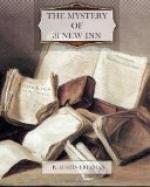“Yes. But the objection to that is the very complete recovery that seems to take place in the intervals.”
“I would not say very complete,” said Mr. Weiss. “The recovery is rather comparative. He is lucid and fairly natural in his manner, but he is still dull and lethargic. He does not, for instance, show any desire to go out, or even to leave his room.”
I pondered uncomfortably on these rather contradictory statements. Clearly Mr. Weiss did not mean to entertain the theory of opium poisoning; which was natural enough if he had no knowledge of the drug having been used. But still—
“I suppose,” said Mr. Weiss, “you have experience of sleeping sickness?”
The suggestion startled me. I had not. Very few people had. At that time practically nothing was known about the disease. It was a mere pathological curiosity, almost unheard of excepting by a few practitioners in remote parts of Africa, and hardly referred to in the text-books. Its connection with the trypanosome-bearing insects was as yet unsuspected, and, to me, its symptoms were absolutely unknown.
“No, I have not,” I replied. “The disease is nothing more than a name to me. But why do you ask? Has Mr. Graves been abroad?”
“Yes. He has been travelling for the last three or four years, and I know that he spent some time recently in West Africa, where this disease occurs. In fact, it was from him that I first heard about it.”
This was a new fact. It shook my confidence in my diagnosis very considerably, and inclined me to reconsider my suspicions. If Mr. Weiss was lying to me, he now had me at a decided disadvantage.
“What do you think?” he asked. “Is it possible that this can be sleeping sickness?”
“I should not like to say that it is impossible,” I replied. “The disease is practically unknown to me. I have never practised out of England and have had no occasion to study it. Until I have looked the subject up, I should not be in a position to give an opinion. Of course, if I could see Mr. Graves in one of what we may call his ’lucid intervals’ I should be able to form a better idea. Do you think that could be managed?”
“It might. I see the importance of it and will certainly do my best; but he is a difficult man; a very difficult man. I sincerely hope it is not sleeping sickness.”
“Why?”
“Because—as I understood from him—that disease is invariably fatal, sooner or later. There seem to be no cure. Do you think you will be able to decide when you see him again?”
“I hope so,” I replied. “I shall look up the authorities and see exactly what the symptoms are—that is, so far as they are known; but my impression is that there is very little information available.”
“And in the meantime?”




